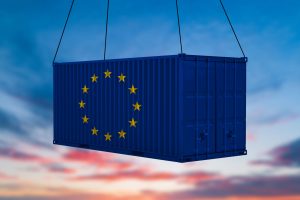Despite sanctions against the Taliban regime, trade between European countries and Afghanistan has seen a slight increase this year. The Taliban’s Ministry of Industry and Commerce said that “trade between Afghanistan and European countries is currently running smoothly, with the volume of trade between the two sides having increased compared to last year.”
According to Akhundzada Abdul Salam Jawad, spokesperson for the Taliban’s Ministry of Industry and Commerce, “In the first eight months of 2025, Afghanistan’s exports to European countries totaled more than $17 million, while imports from these countries reached nearly $143 million. These countries include Germany, Sweden, France, Italy, the Netherlands, Spain, the United Kingdom, and many others.”
Additionally, according to Afghanistan’s Chamber of Commerce and Investment, trade relations between the EU and Afghanistan have been expanding despite the lack of facilities, including transit and business visa facilities, along with the standardization of export products. In this regard, Afghanistan’s Chamber of Commerce and Investment spokesperson, Jan Aqa Naveed, said, “There is high demand for Afghan products in European markets. Fortunately, our exports to European countries continue. However, challenges remain, and Afghanistan needs bilateral agreements with countries located along the routes leading to the European Union — particularly along the Lapis Lazuli corridor.”
The Lapis Lazuli Corridor was opened in 2018 and connects Afghanistan to Europe via Turkmenistan, Azerbaijan, Georgia and Turkey.
The EU is one of Afghanistan’s important trading partners after its immediate neighbors, including Iran, China, India, Pakistan, Uzbekistan, and Kazakhstan. Afghanistan is a beneficiary of the European Union’s “Everything but Arms (EBA)” arrangement due to its least-developed country status. In 2023, Afghanistan’s total trade with the Union amounted to 148 million euros, accounting for 3.6 percent of Afghanistan’s total trade. In 2024, the total trade between the EU and Afghanistan climbed to 302 million euros, with 39 million euros being Afghanistan’s exports to the EU and 263 million euros in imports from the EU.
According to the European Commission, the EU was Afghanistan’s seventh largest trading partner in terms of total trade, as its fifth largest exporting partner and seventh largest importing partner in 2024.
Despite the increase in trade with the EU, Afghanistan is still faced with challenges that could further create hindrances to trade. Factors such as trade costs (including high transportation costs due to lack of infrastructure, which forces reliance on air corridors), foreign exchange costs, costs related to distribution of goods at the local level, along with policy challenges including tariffs, have restricted Afghanistan’s trade with the EU.
These challenges have been worsened by the Taliban’s takeover of Kabul four years ago. The EU sanctions against the Taliban, the de facto rulers of the country, have made the situation worse not only for trade but also for the common Afghans. Currently, the EU sanctions regime applies to five Afghan entities and 135 individuals. It also includes the freezing of assets.
The EU, nonetheless, has been providing humanitarian aid to Afghanistan. In 2025, the EU provided over 161 million euros in humanitarian aid to Afghanistan through partner organizations, including U.N. agencies, international and nongovernmental organizations. Prior to the Taliban’s takeover, the EU provided cooperation assistance and development aid to Afghanistan. Since August 2021, the EU has put in place specific measures to ensure that the people of Afghanistan receive benefits but that no funding goes to the Taliban.
The EU, along with the international community, does not recognize the Taliban regime as the official representative of the Afghan people. It maintains the stance that recognition is possible only in case the regime respects international obligations.
However, Afghanistan was the largest beneficiary in the world of EU development aid, at over 4 billion euros, between the fall of the first Taliban regime and its return to power in August 2021.
According to the European Parliament’s “Delegation for Relations Afghanistan (D-AF)” report, before U.S. and NATO forces withdrew from Afghanistan, Afghanistan-EU relations were conducted under the Cooperation Agreement on Partnership and Development, which was signed in 2017 and approved by the European Parliament in 2019.
The EU adopted an Afghanistan strategy in 2017, which intended to set a framework for the EU’s work in the country in cooperation with the Afghan government, civil society, and other stakeholders for a democratic and peaceful country. The fall of Kabul to the Taliban led the EU to redefine its policies and position vis-à-vis Afghanistan. It maintains its engagement with Afghan civil society as well as with the Taliban in order to seek dialogue through its delegation in Kabul which reopened in January 2022.
Given the existing barriers to trade, in addition to sanctions, expanding trade with the EU holds great significance for Taliban rule in Afghanistan. But it nonetheless does not equate into recognition for the regime. None of the EU member states has any diplomatic missions in Afghanistan, nor have they allowed any Taliban envoys to participate in Afghanistan’s diplomatic missions in their respective countries, except for Germany, which recently allowed Taliban envoys in the country to arrange the deportation of Afghans. The EU’s stance with respect to recognition for the Taliban is clear: an inclusive government with respect for human rights, without which trivial increases in trade will not bring any significant relief for crisis-ridden Afghanistan.




























